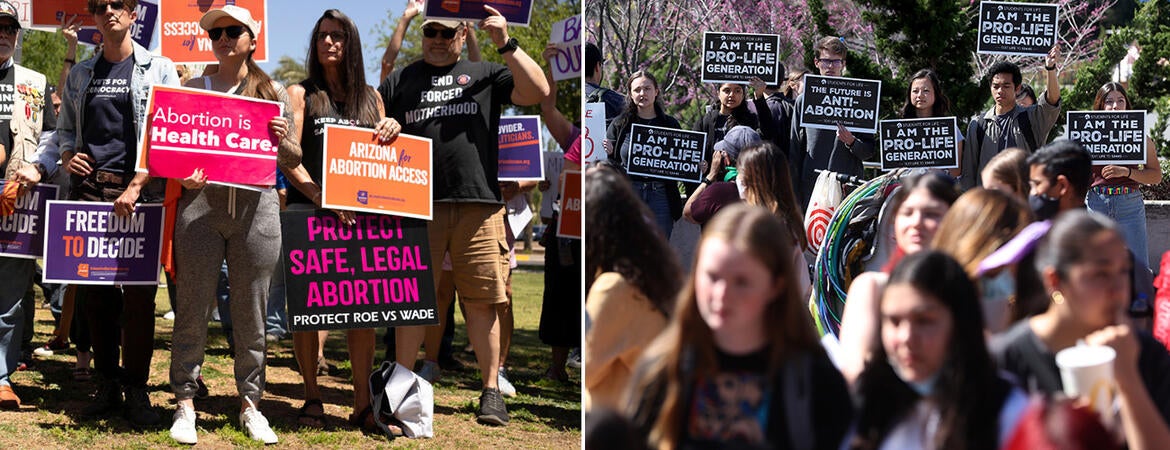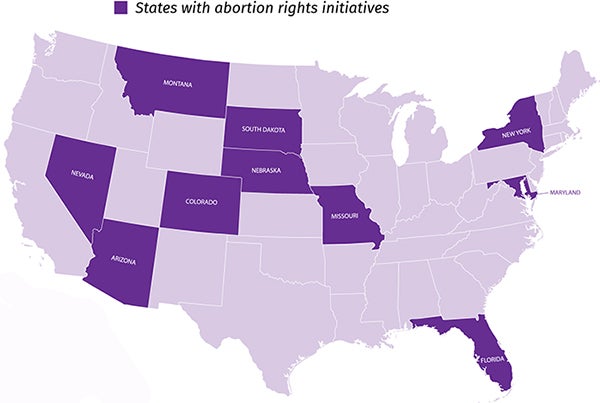
As the 2022 U.S. Supreme Court decision to allow states to criminalize abortion procedures still reverberates across the nation, abortion has become a major issue in the presidential election.
Former president Donald Trump, the Republican nominee, has celebrated his appointments of three of the conservative Supreme Court justices who voted in the 2022 to overturn the landmark Roe V. Wade decision that had made abortion a constitutional right for a half-century. Vice President Kamala Harris, the Democratic nominee, staunchly supports abortion rights.
The abortion issue is coming in sharper focus in 10 states — Nevada, Arizona, Montana, Colorado, Nebraska, South Dakota, Missouri, Florida, Maryland, and New York — where abortion rights initiatives are up for direct votes in November.
Here we ask Shaun Bowler, professor of political science, and Andy Crosby, an assistant professor of teaching in the School of Public Policy, to weigh in how the plethora of state abortion rights initiatives may affect the presidential election.
Question: How important is the abortion issue to American voters when compared to the economy, immigration, foreign policy, and climate change?
Andy Crosby: A Quinnipiac University Poll conducted August 23-27 shows that 64% of respondents rated abortion as either "extremely important" or "very important" to their choice in the election. This proportion is lower than the economy (87% of respondents rate as "extremely" or "very" important) as well as immigration (71%). However, it is higher than the Israel/Hamas war (53%), Russia/Ukraine war (51%), and climate change (48%).
I also believe analyzing swing states is critically important, as these states will likely decide the election. A recent Bloomberg/Morning Consult poll of swing state voters (Arizona, Georgia, Michigan, Nevada, North Carolina, Pennsylvania and Wisconsin) also conducted August 23-27 indicates that 53% of respondents rated abortion "very important" when deciding who to vote for in the 2024 election. That proportion is lower than the proportion of respondents who indicated the economy was "very important" (84%) as well as immigration (59%). However, it is higher than climate change (39%), the Israel/Hamas war (33%), and the Russia/Ukraine war (30%).
In addition, within the swing states poll, respondents were asked to identify their single most important issue when deciding who to vote for, and we see a similar pattern. By far the largest share of respondents (38%) indicated that the economy was their most important issue, followed by immigration (14%), abortion (10%), climate change (3%), the Israel/Hamas war (1%), and the Russia/Ukraine war (0%).
Shaun Bowler: Overall it is clearly an important issue for very many people, and it is the most important for many who are on both sides of the particular issue. So, one answer is it depends on who you ask. The other two big issues for this election seem to be related to the economy and immigration and for some voters those are the most important issues. But unquestionably reproductive rights is the most important - and often deeply personal - issue for many.
Given that people in two red states reacted to the Dobbs decision by voting by wide margins to protect abortion rights (18% margin in Kansas in 2022 and 14% in Ohio last year), do you expect the abortion rights initiatives this year to result in a greater turnout of Democratic voters and thus give Harris an advantage in those 10 states?
Bowler: For most of the states with measures it won’t really matter. No matter who the candidate is or what they say several of the states — Missouri, Montana and South Dakota, in particular — are going to vote in a Republican, while New York will support a Democrat. The key states will be Arizona and Nevada, which are swing states, and these issues could bring out voters to help tip the result. There is that possibility. But I would say that the bigger point is that — whether they pass or fail— there will be major consequences for people’s lives in those states.
To what degree are the abortion rights initiatives motivating factors to bring out more women and young people who are more likely to vote for Harris?
Bowler: That’s one of the expectations. And on an issue basis that’s what should happen because this is a pretty straightforward and open part of Ms. Harris’ platform. The question of course is whether these are people who would have stayed at home anyway. It’s not clear.
For the most part the people would have been supporters of Ms. Harris anyway given that, as I say, it is a clear policy commitment. But the downside from the Dem point of view is that the measure will encourage those who oppose abortion to turn out and vote. And there is some reason to think these may be people who would have stayed at home rather than vote for Mr. Trump. We know that a number of Republicans object to Mr. Trump for various reasons. They might have been tempted to sit this one out. The bottom line is that the net effect here is likely to be small. As we keep hearing, however, it is a very close race and so even small effects may make a difference.
Does polling show significant amounts of voters likely to vote for Trump and in favor of an abortion rights initiative?
Crosby: We do see at least some Republicans indicate that they believe Harris would do a better job handling abortion. In the national poll (Quinnipiac), although 83% of Republicans believe Trump would do a better job at handling abortion, 12% of Republicans believe Harris would do a better job. The reverse is not true: 98% of Democrats believe Harris would do a better job handling abortion, and only 1% believe Trump would do a better job. We also see Independents break for Harris on this issue: 57% believe Harris would do a better job, and 32% believe Trump would do a better job.
The New York Times/Siena College swing state polls mentioned above again show similar trends. The Michigan, Pennsylvania, and Wisconsin poll shows that 17% of Republicans, as well as 19% of respondents who indicated they plan to vote for Trump in 2024, indicate that they trust Harris to do a better job on the issue of abortion. Similar results exist in the Arizona, Georgia, Nevada, and North Carolina poll: 16% of Republicans, as well as 18% of respondents who indicated they plan to vote for Trump in 2024, indicate that they trust Harris to do a better job on the issue of abortion.
Bowler: Yes, there may be people who combine this view. They may, for example, think other issues are more important than abortion — maybe one of the issues you mention above — and see Mr. Trump more positively on that issue.
In the blue states of New York and Colorado, the balance of power in the House of Representatives may hang on whether Republicans can retain seats in more conservative rural and suburban districts. Will abortion rights initiatives in those states increase the chance of flipping Congress to Democratic control?
Bowler: Maybe Colorado. But a broader effect would be whether or not the two candidates have coattails and bring out people to help candidates down ballot. And of course their respective stances on abortion will help shape turnout overall.
Both candidates have shown interest in helping candidates lower down. With Mr. Trump, for example, he will give a shout out or an endorsement to candidates he likes on his Truth Social account. It’s a bit less personalized and a bit more systematic with Ms. Harris. She will do that but has also helped fund some campaigns, for example.
While Trump has celebrated his appointments of three conservative Supreme Court justices who voted in favor of Dobbs, he is now distancing himself from the decision and moderating his stance on abortion, saying it be allowed in early pregnancy, when pregnancies result from incest or rape, or when the life of the woman is threatened. Does polling show he can have it both ways?
Bowler: No. But he will try. A hard line on abortion is something that appeals to primary voters. But the general public have more middle-of-the-road views. The Democrats seem to have the position which is closest to the majority viewpoint, as the results in Ohio and Kansas showed. Meanwhile, the Republicans - and Mr. Trump - are having problems coming up with a consistent viewpoint.
As a concrete example of that — and of the problems the abortion issue presents to Republicans — we can see the way Mr. Trump’s campaign got tied in knots a little over whether he would support the Florida measure. At first he indicated he wouldn’t, then backtracked. Similarly, Republican party opinion on IVF was at first against it (for the same reason they opposed abortion) but then realized it was very popular even among Republicans and so backtracked there.
Crosby: One question we can examine here is which candidate people believe would be better to handle the issue of abortion, and polls currently show that respondents believe Harris would do a better job than Trump. In the national poll (Quinnipiac), 55% of respondents believe that Harris would do a better job handling the issue of abortion, compared to 38% for Trump. The swing state poll (Bloomberg/Morning consult) shows similar results: 55% of respondents trust Harris more to handle abortion, compared to 34% for Trump.
Although the Bloomberg/Morning Consult swing state poll did not have a parallel question, we do have swing state data from two earlier polls from New York Times/Siena College which combined cover the same swing states and which both show similar trends. A poll of Michigan, Pennsylvania, and Wisconsin registered voters conducted August 5-9 shows that 59% of respondents indicated that they trust Harris to do a better job on the issue of abortion, compared to 35% for Trump. Similar results exist in the Arizona, Georgia, Nevada, and North Carolina poll conducted August 8-15: 56% of respondents indicated that they trust Harris to do a better job on abortion, compared to 34% for Trump.
What does the number of abortion rights state initiatives say about U.S. politics?
Bowler: The main impact of these measures is not so much on turnout and whether it is up or down for a particular candidate, but it is the impact on people’s lives that will be felt if the measure passes or fails. I just want to underscore that it is a very serious and deeply personal issue for many.
One dimension of this issue, though, is the way that direct democracy is working as a process. Many of the measures on the ballot are being put there by voters as a response to actions taken — or threatened — by Republican/MAGA legislators. As I noted, the Republican party is at odds with majority views on this issue. Which doesn’t stop legislators trying to put in place policies that they support. But direct democracy processes provide an answer to that. We saw something similar over marijuana use: legislators were much more conservative than voters on this.





